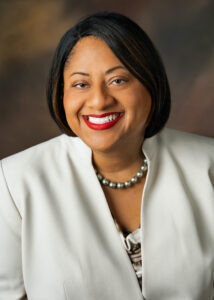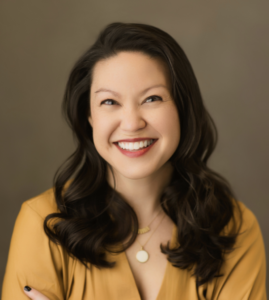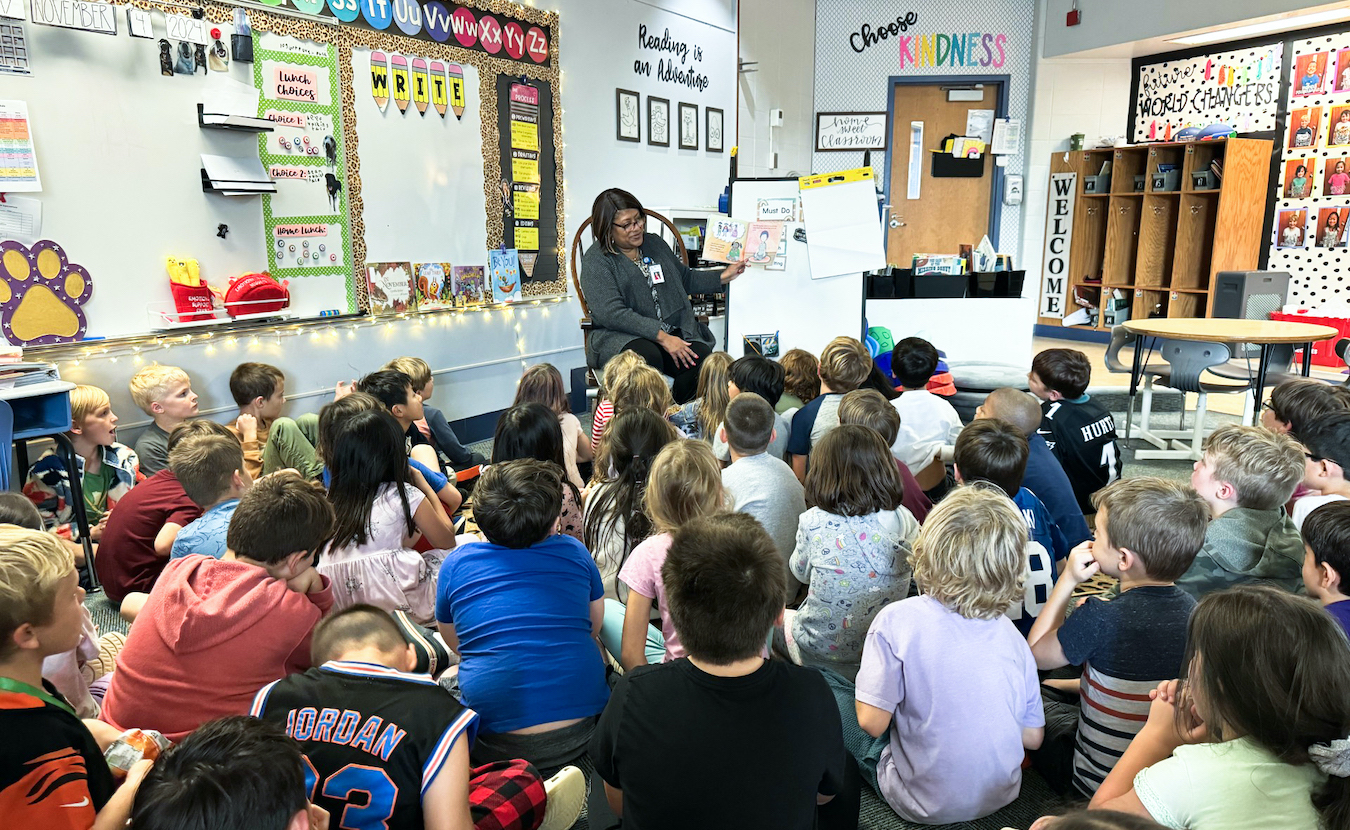“
My hope is with the children. When they become adults, I think we’re going to be in a much better place as a country.
”
—Dr. Markay Winston
Three months after being appointed superintendent of the Monroe County Community School Corporation, Markay Winston finds plenty of reasons to be optimistic about the district’s future, including dedicated teachers, lively students, and a supportive community.
“The opportunity to remove barriers is probably what appeals to me most about the position,” she says. “I feel the lightness, the joy, to be able to organize the system in a way that benefits every learner, and to be really intentional about that.”

Dr. Markay Winston became the new MCCSC superintendent in January 2025. | Courtesy photo
The job also comes with heavy responsibilities. MCCSC enrollment has been flat or declining since the COVID-19 pandemic, a trend that reflects a lack of growth in the county’s school-age population as well as some students moving to charter or private schools or to homeschooling. Having fewer students means less money under Indiana’s school funding formula. Winston says the district will implement cost-cutting measures, including taking a hard look at replacing staff who quit or retire.
She says she feels “the weight of worrying about, Do we have money to keep all the staff we have? And the fact of the matter is, we don’t.”
Winston, 59, grew up on a farm near Ottumwa, Iowa, a town of 25,000. She was one of seven siblings in a family that was committed to service and deeply involved with the local Second Baptist Church. She enjoyed sports and music; she and a brother and sister entertained on violin, viola, and cello at family gatherings.
And the kids “played school,” pointing to her future career. “I was always the teacher,” she says. “My family still says I’m bossy.”
She traces her interest in justice and her choice to work in education to early experiences, including having a cousin who “learned differently.” “We would ride the bus to school together,” she says, “then we’d get off the bus and I wouldn’t see him again until we got on the bus to go home. I thought, ‘Where is he? Why isn’t he in class with the rest of us?’ It was the early ’70s, and students with disabilities were just kind of not seen.’”
Winston earned an undergraduate degree at Central College in Pella, Iowa, where she played basketball (and later served on the college’s board of trustees). She moved to Ohio, where she earned master’s and Ph.D. degrees from the University of Cincinnati and worked for 20 years as a school psychologist and administrator in Cincinnati and Dayton schools. Then she spent four years as chief diverse learning officer for Chicago Public Schools.
She came to MCCSC in 2017, serving first as assistant superintendent and then as deputy superintendent. When Jeff Hauswald left last summer after three years as MCCSC’s leader, Winston was named interim superintendent. The school board voted unanimously to make her appointment permanent, starting in January.
Winston’s six months as interim leader included an “entry plan” that focused on goals of accelerating learning, establishing a strong governance team, improving administrative efficiency, and strengthening communication with staff and the community.
“It’s about transparency,” she says. “It’s about listening and learning. It’s about letting people know this is where we’re going.”

School Board President April Hennessey. | Courtesy photo
School Board President April Hennessey says Winston is “doing just an amazing job,” bringing much-needed stability and calm after tumult that engulfed the district over discussions of changing high school schedules and merging elementary schools.
“The way she engages, the way she listens, it’s so well suited for this moment,” Hennessey says. “She doesn’t shy away from conflict, but she isn’t looking for conflict. … I think we need someone like that in this role at this point.”
A proposal to merge two elementary schools, low-poverty Childs and high-poverty Templeton, has been paused but not abandoned, with the school board having responded to a call for possibly redistricting elementary schools for greater socioeconomic balance. Winston says she will appoint a committee to advise her and the board on the issue.
“The board has said that that is an issue, and their number one priority is to balance SES [socioeconomic status] in our schools,” she says. “There is a lot of research that talks about the benefit of children from different backgrounds learning together.”
Winston has also had roundtable meetings with business leaders, discussing ways they can work with the school corporation. “I think she’s demonstrated that she’s an excellent leader for the school corporation,” says Eric Spoonmore, president and CEO of the Greater Bloomington Chamber of Commerce. “She understands the business of education, and she understands the community extraordinarily well.”
Spoonmore says the chamber looks forward to continuing to support the Monroe County and Richland-Bean Blossom school corporations with its Success School program, which promotes career awareness, primarily for middle school students. Businesses will also be called upon as partners as Indiana enacts new high school diploma requirements that emphasize work-based learning, internships, and apprenticeships.

Dr. Markay Winston at Bloomington High School South talking to students in the student-run Scholar Sips Cafe. | Photo by Sarah DeWeese
MCCSC voters approved two recent referendums to raise property taxes to increase funding for the school corporation. The first, in 2022, was to increase salaries for teachers and staff. The second, in 2023, pays for textbooks, curricular materials, and school supplies, and to support pre-K programs in MCCSC schools and community providers.
While the first passed overwhelmingly, the second was barely approved. But Winston says the pre-K launch has been an “utter success.” Officials had hoped for at least a 20 percent increase in 4-year-olds enrolled in pre-K, she says. The increase has been 73 percent.
“To me that’s a testament to the need and a testament to my team,” she says. “And we spent every waking minute last summer positioning ourselves and getting ready.”
Spoonmore says the chamber supported the referendums and is enthusiastic about the expanded preschool program. “We see that as a way to attract workforce to Monroe County,” which is losing working-age population, Spoonmore says.
While the community has backed funding for MCCSC initiatives, the overall fiscal picture is shaky. Enrollment, the basis for state funding, declined with the pandemic and has not recovered; it’s now 10,480, down 7.6 percent from five years ago. The Indiana General Assembly is poised to approve only modest school funding increases for the next two years, and much of that will go to expand Indiana’s private school voucher program. A state property tax relief proposal, in its current form, will cost the district $15 million over three years. Federal funding for special education and high-poverty schools may be slashed.
“
I was always the teacher. My family still says I’m bossy.
”
—Dr. Markay Winston
With revenue decreasing and costs rising, Winston told the school board that MCCSC will need “long-term, structural changes” to balance its budget. She says the district will embark on a two-year plan that prioritizes “natural attrition,” assessing whether and how to replace the 80 to 100 teachers and 250 to 300 support staff who leave each year.
Winston says decisions will center the needs of students and will take into account their opinions, which she hears at meetings of her Student Voice Advisory Council, an outspoken group of high school students who provide input and feedback. Despite the challenges, she says, students buoy her spirits.
“You know, our children are great,” she says. “They are some of the most talented, brilliant young minds. … They talk about their mental health needs, they talk about the stress of academics. They talk about their fear of what’s going on in our country.
“But overall, our kids are good,” she says. “My hope is with the children. When they become adults, I think we’re going to be in a much better place as a country.”


